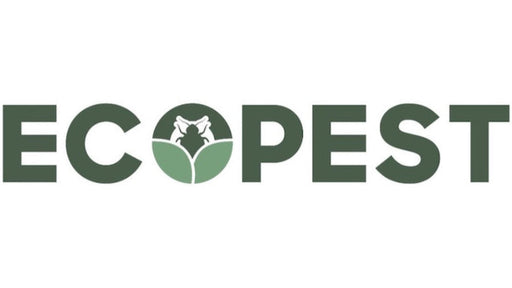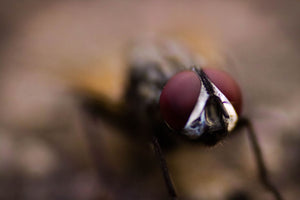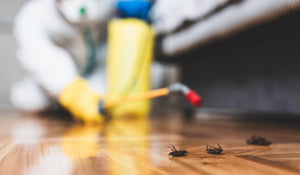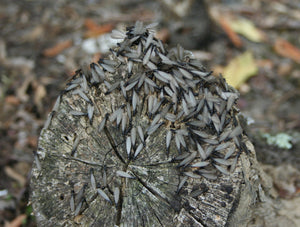
Are you dealing with uninvited guests in your drains? You know, those pesky drain flies that seem to appear out of nowhere. Well, you're not alone! These little nuisances can be a real headache, but don't worry, we've got your back.
In this blog, we're diving into the world of drain flies - understanding who they are, why they love our drains so much, and most importantly exploring some effective pest control products that'll help you say goodbye to these unwelcome visitors for good.
What Are Drain Flies?
So, have you ever spotted those tiny, moth-like insects fluttering around your sink or shower drain and wondered, "What on earth are these little guys?" Well, meet the drain flies, also affectionately known as sink flies, sewer flies, or if you want to get scientific, 'Psychodidae'.
These little critters are more than just a nuisance; they're like the uninvited guests who decide your drain is the perfect spot for a house party.
You might think, "Okay, but are drain flies harmful?" Well, you'd be surprised! A lot of people across the USA deal with these drain dwellers. We're talking about many households, especially in areas with high humidity or older plumbing systems. And while drain flies aren’t organizing a coup against us humans, their presence can be more than just an annoyance.
So, what kind of harm do they cause?
First off, let's be clear: drain flies aren't known to bite or transmit diseases like some of their other pesky counterparts.
But, and this is a big but, they can contribute to some less-than-pleasant conditions. Think about it – they love hanging out in damp, organic matter-rich environments (like your drains), which can be breeding grounds for bacteria and other microbes. For people with allergies or respiratory issues, these conditions and the flies themselves can be a trigger. Plus, a cloud of flies emerging from your sink isn't exactly the highlight of a clean and cozy home, right?
Why Do I Have Drain Flies?
Drain flies are like those friends who only show up when there's a buffet. And in this case, the buffet is the organic gunk in your drains.
These flies are attracted to moist environments rich in decaying organic material – think of the slimy film inside your drains, full of decomposing food, grease, hair, and other goodies (or yuckies, more accurately). It's a drain fly's version of a five-star hotel!
- Love at First Slime: Drain flies have a thing for the slimy buildup in drains. If your kitchen sink, bathroom drain, or any other drain in your house isn't cleaned regularly, it becomes the perfect breeding ground for these flies.
- Neglected Areas Are Their VIP Lounges: Those drains that you rarely use? Prime real estate for drain flies. When water sits stagnant and organic matter starts to decompose, it's like rolling out the red carpet for these critters.
- Not Just Drains: Think beyond the sink. Drain flies can also set up shop in places where moisture and decay are present. This could be your leaky pipes, overwatered plants, or even that seldom-cleaned trash can under the sink.
How Long Do Drain Flies Live?
Drain flies, those fuzzy, moth-like insects buzzing around your drains, have a surprisingly short lifespan. We're talking about an average of just two weeks! But don't let their brief life fool you. In the insect world, a lot can happen in two weeks, especially when it comes to drain flies.
Here's the deal: in those two weeks, a single drain fly can lay hundreds of eggs. These eggs hatch into larvae, which then mature into adults, all ready to start the cycle again. This whole process from egg to adult can happen in just about 7 to 28 days, depending on conditions like temperature and humidity.

How Are Drain Flies Harmful?
While drain flies are not the villains of the pest world, they can cause a few issues that you should be aware of.
Allergies and Respiratory Issues
First things first, drain flies themselves aren't going around biting or stinging people. However, they can still be a health nuisance.
When they die, their decaying bodies can release particles into the air. These particles, if inhaled, can trigger allergies or aggravate respiratory conditions like asthma. It's not the flies themselves, but what they leave behind that can cause problems.
Spread of Bacteria
Drain flies love hanging out in some not-so-clean spots – think drains, sewers, and other damp areas filled with decaying organic matter. This means they can carry bacteria and other germs from these places into your home.
While they don't transmit diseases directly like some other insects, their potential to spread bacteria around your living spaces is a concern, especially when it comes to food preparation areas.
Indicators of Unsanitary Conditions
Their presence often signals a bigger issue – unsanitary conditions.
Drain flies are attracted to and breed in areas where there's decaying organic matter and stagnant water. This can include clogged or malfunctioning drains. So, if you're seeing a lot of them, it might be time to investigate your plumbing or cleanliness practices.
An easy way to check if you have an infestation is to use sticky fly traps in the areas where you notice a few insects buzzing around. If you catch a few bugs in your kitchen and bathroom it’s time to take the matter more seriously.
Mental and Emotional Impact
On a less tangible note, the presence of drain flies can be mentally irritating.
Their buzzing and mere presence can be annoying, especially if you're dealing with a large number of them. For some people, this can increase stress and anxiety, particularly for those with a sensitivity to pests. Did you know that research shows us that pest infestations can be linked to depressive states and mental issues? That’s one of the reasons why so many people wonder are drain flies harmful, and the short answer is — yes!
How To Get Rid of Drain Flies?
Getting rid of drain flies can be achieved through several simple and effective home remedies. Here are some methods you can try:
Inspect and Clean Drains
Start by inspecting your drains.
Use a small knife or similar tool to scrape the sides of your kitchen or bathroom drains. Look for larvae in the sludge, and if you find any, scrape it out and dispose of it immediately in the trash. Ensuring your drains are free of organic build-up is crucial in preventing drain fly breeding.
Boiling Water
Pouring hot water down the drain can effectively kill drain flies, their eggs, and larvae.
However, if you have PVC pipes, be cautious about using boiling water as it can damage the pipes. Instead, use very hot water to avoid damaging your plumbing system.
Baking Soda, Vinegar, and Salt Mixture
A combination of baking soda, vinegar, and salt can be particularly effective.
This mixture causes a reaction that helps reach and eradicate flies and their eggs in the pipes. Pour the mixture down the drain, let it sit overnight, and then flush with hot water the next morning. The salt acts as an additional abrasive to help eliminate pest infestations.

EcoPest Supply - We’ve Got You Covered
If you are tired of those annoying drain flies buzzing around your home, let's introduce you to EcoPest Supply, your new best friend in the battle against these pesky intruders. EcoPest Supply understands that dealing with pests is more than just a one-time fix – it's about finding long-term, sustainable solutions.
What makes EcoPest stand out is the commitment to customer satisfaction and environmental responsibility. One of the most popular products that will help you with all flying insects and drain flies are the sticky fly traps. Place them near problem areas, and watch as they attract and trap those annoying flies, reducing the adult population and giving you some peace of mind.
Not sure where to start? EcoPest also offers professional consultation services. The experts can help you identify problem areas and suggest the best products for your specific situation.








